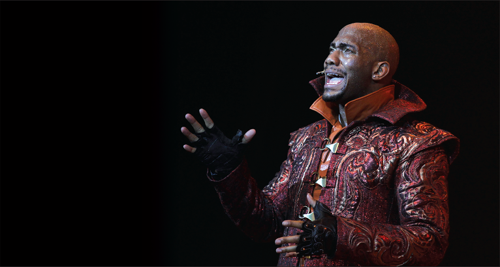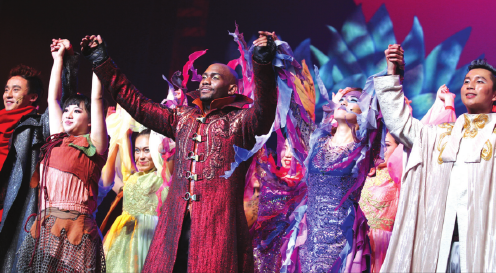
CHINA DAILY
Broadway actor Apollo Levine presents an aspiring Monkey King.

CHINA DAILY
The cast of Monkey King respond to the audience's applause.
Every Chinese grows up with the story of the Monkey King, but I'll bet not many have ever seen it like this: the main character is an African-American who dances hip-hop; the Emperor of Heaven wears Prada, Gucci and Armani; the Dragon King and his wife fight with each other about whether to give weapons to the monkey or not; their three daughters, all in modern dresses and high-heel shoes, compete for the heart of the monkey.
Everything in the new version of the Monkey King musical, coproduced by Beijing Performance& Arts Group and Beijing Genhua International Culture and Media, makes jaws drop.
Broadway actor Apollo Levine, who plays the monkey, sings in English while he duets with the Emperor of Heaven actor who sings in Chinese. The monkey converses in English with his followers, who all speak in Chinese.
Audiences may feel a bit disconnected in the first few minutes, but are soon so drawn by the actors' emotions and the dramatic story, that they will not find anything strange in the musical.
The story is no longer a hundred-year-old folklore about the gods, the spirits and Buddha, but an aspiring contemporary drama about a young man who keeps leaving home in search for adventures, after he gains power, he takes the responsibility to protect his family and finally realizes the value of home.
"I had no idea about the Monkey King before I came here. The cast and director are wonderful and they help me learn everything about the story. I watched movies and television versions," Levine says.
"I always try to find something in me similar to the character and get to the table. Ironically, I find myself in the monkey. Like him, I travel and explore everywhere. I don't want to stay at home. The play helps me to find my responsibility in my family."
Cao Jin, president of Beijing Genhua, says they received government funding to do a musical with an international cast and aspired to take it to Broadway. He was introduced to Tony Stimac, a veteran Broadway musical producer.
Stimac invited the American team including James Racheff, who has been a playwright and lyricist for more than 25 years; the songwriter Louis St. Louis, who is also composer of the famous film Grease (1978) in which John Travolta sang the hit Sandy; and the Emmy Award nominee choreographer Bubba Carr.
"Monkey King in China is like Hamlet in the West, you have thousands of versions: Peking Opera, movie, TV...We have many modern dressed productions of Shakespeare, why not do a Monkey King that has never been done before," Stimac says in his Beijing office.
"We consider the Monkey King as China who overcomes all the difficulties and challenges and now has big power while the Heaven is like the West who always told China what to do. Now China has all the power, but learning to use that power now on the world scale is what China is dealing with and that is what the monkey has to do in the story."
The musical portrays a very touching relationship between the monkey and his fellow primates, the monkey and his master, and the monkey and his enemies.
"We want to humanize the characters. It's pretty hard to feel sympathy for Superman, because he can do anything. And the Monkey King is China's Superman. China invented the super hero 600 years ago before Iron Man, Batman, Spider-Man, Superman, and super heroes are very popular now in commercial entertainment. So we feel good to let the West know the Chinese super hero. But we want him to be as human as possible, so people could care about him," Stimac says.
As for the Dragon King, they add the element that he is very concerned about his belongings. The monkey comes and wants the weapon from him but he refuses.
"Many men and women in the world always fight over such matters. The wife wants to keep everything and the husband wants to throw them out. We think it's a human character," Stimac says.
He says the musical was not invented by the Americans. Europeans brought the art form to America and they first copied, changed and finally made up their own. China now is on the same course. The foreign influence comes in and the local team works together to learn from them.
China has tried to stage Chinese versions of Cats and Mama Mia, which is useful and helpful in moving the form forward because the first step is copy, the second step is change and the final step is create the original Chinese musical.
"I personally don't think there will be a musical theater industry until they tell Chinese stories in the Chinese way to Chinese people, in the Chinese language. In the 1800s, Britain ruled the world, Britain exported its culture all over the world. Then in the 1900s, America exported its movies, jazz music and Broadway musicals. And now this is the 21st century, this could be China's century, China will do the same thing, exporting its culture.
"China has exported acrobatics, kung fu, Peking Opera, dance-but none of those things tells stories that the West can understand. If I see a Peking Opera, it's too stuck-in-the-culture, you have to know who the characters are, what they stand for, the history and the background, among other things. But the musical is international. I can enjoy a South Korean musical or a Japanese musical."
Meanwhile, China does not yet have a market to support long-running musicals in a theater.
In West End London and Broadway, you can rent a theater for a musical and if your shows succeed, you can stay there for 10 years. The investment is too high and you won't be able to make money in two weeks. The solution is to tour. Shows can tour in China, that's how Japan started 30 years ago.
Stimac also wants to do a musical about the Song family.
"I came upon a book about Song's three sisters. Who can believe such things, that one (the youngest Madame Chiang Soong Meiling) married Chiang Kai-shek, one (Soong Ching Ling) married Sun Yat-sen and another (the oldest, Soong Ai-ling) married Kung Hsiang-hsi (the Nationalist financial minister). That's Les Miserables in China. Someday that story must be told in a big epic opera."
Contact the writer at chenjie@chinadaily.com.cn.
We recommend:
